ed形容词和
(完整版)-ed形容词和-ing形容词辨析和练习

–ed形容词和–ing形容词的用法区别一、传统的观点许多参考书认为:-ing形容词与表示事物的名词连用,-ed 形容词与表示人的名词连用。
此说法在很多情况下是可行的,但表述欠准确,在许多情况下却是不可靠的。
如:-ing 形容词用于人的情况就比比皆是:假若你的老师说话幽默、讲课生动,那么不仅他的课非常interesting,而且你会说他是一个interesting man(有趣的人)。
比较:I’m interested in interesting people. 我对有趣的人感兴趣。
He was worried about his worrying son. 他为他令人担忧的儿子感到担忧。
He was annoyed with the annoying person. 他对这个讨厌的人很生气。
另一方面,-ed 形容词用于指物的情况也不少见。
比较并体会:a frightened look 害怕的表情(指带有这种“表情”的人感到害怕)a frightening look 吓人的表情(指这种“表情”令人害怕)an excited talk 心情激动的谈话(指“谈话”的人心情激动)an exciting talk 令人激动的谈话(指听“谈话”的人心情激动)由于传统的观点说得太绝对,有时做起题来还可能会因此掉入命题人的陷阱,请看下面一题:_____ do you think of your English teacher? Is he _______?A. What, interestingB. What, interestedC. How, interestingD. How, interested此题考查两方面的知识点:一是考查what do you think of…与how do you like…的用法区别(两者搭配不同,但意思相同);二是考查interesting与interested 的用法区别。
ed形容词和ing形容词

–ed形容词和–ing形容词的用法区别1,以后缀–ed结尾的形容词(如ashamed, delighted, excited, frightened, interested, moved, pleased, surprised, worried等)通常用于说明人,不用于说明事物,即使它们所修饰的名词是事物,那它们指的也是与该事物相关的人。
如:He had a pleased smile on his face.他脸上露出了满意的微笑。
He told me the news in a very excited voice.他声音很激动地告诉了我这个消息。
原则上,-ed 形容词通常直接用于说明人,若修饰事物,则多为air(神态), appearance(外貌), cry(哭声), face(表情), voice(声音), mood(情绪)等显示某人的情感状况的名词。
2. 以后缀-ing 结尾的形容词(如delighting, exciting, frightening, interesting, moving, surprising, worrying 等)主要用于说明事物,表示事物的性质或特征,若用它们说明人,则表示此人具有此性质或特征。
如:The story is very interesting. 这个故事很有趣。
The man is very interesting. 这个人很有趣。
请再比较并体会以下句子:He is frightened. 他很害怕。
He is frightening. 他很吓人。
He has a frightened look on his face. 他脸上带有惊恐的神情。
He has a frightening look on his face. 他脸上带有吓人的神情。
I read an interested expression on his face. 我看到他脸上露出一种感兴趣的表情。
ed形容词及ing形容词辨析及练习.doc
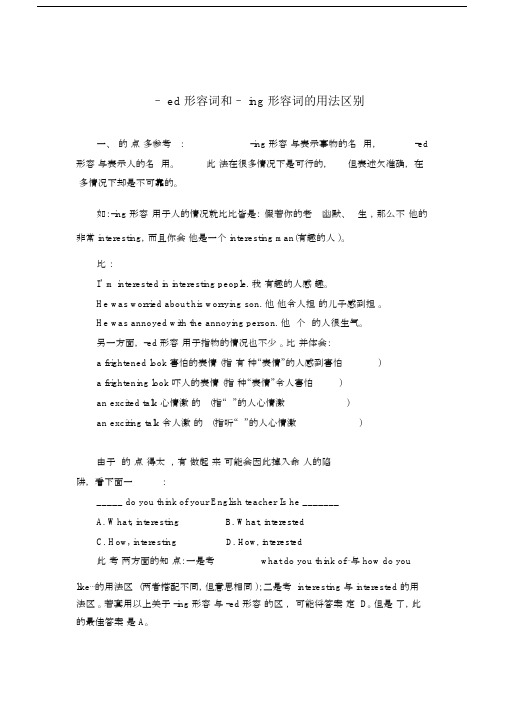
– ed 形容词和– ing 形容词的用法区别一、的点多参考:-ing 形容与表示事物的名用,-ed 形容与表示人的名用。
此法在很多情况下是可行的,但表述欠准确,在多情况下却是不可靠的。
如:-ing 形容用于人的情况就比比皆是:假若你的老幽默、生,那么不他的非常 interesting,而且你会他是一个 interesting man(有趣的人 )。
比:I’ m interested in interesting people. 我有趣的人感趣。
He was worried about his worrying son. 他他令人担的儿子感到担。
He was annoyed with the annoying person. 他个的人很生气。
另一方面, -ed 形容用于指物的情况也不少。
比并体会:a frightened look 害怕的表情 (指有种“表情”的人感到害怕)a frightening look 吓人的表情 (指种“表情”令人害怕)an excited talk 心情激的 (指“ ”的人心情激)an exciting talk 令人激的 (指听“ ”的人心情激)由于的点得太,有做起来可能会因此掉入命人的陷阱,看下面一:_____ do you think of your English teacher Is he _______A. What, interestingB. What, interestedC. How, interestingD. How, interested此考两方面的知点:一是考what do you think of⋯与 how do youlike⋯的用法区 (两者搭配不同,但意思相同 );二是考 interesting 与 interested 的用法区。
若套用以上关于 -ing 形容与 -ed 形容的区,可能将答案定 D。
但是了,此的最佳答案是 A。
二、正确的观点关于 -ing 形容词与 -ed 形容词的区别,比较准确的表述应该是:1.以后缀– ed 结尾的形容词 (如 ashamed, delighted, excited, frightened, interested, moved, pleased, surprised, worried 等)通常用于说明人,不用于说明事物,即使它们所修饰的名词是事物,那它们指的也是与该事物相关的人。
带ed形容词
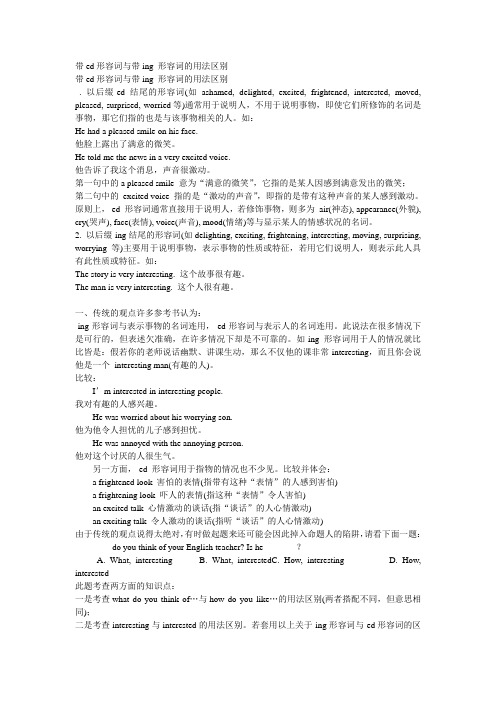
带ed形容词与带ing 形容词的用法区别带ed形容词与带ing 形容词的用法区别. 以后缀-ed结尾的形容词(如ashamed, delighted, excited, frightened, interested, moved, pleased, surprised, worried等)通常用于说明人,不用于说明事物,即使它们所修饰的名词是事物,那它们指的也是与该事物相关的人。
如:He had a pleased smile on his face.他脸上露出了满意的微笑。
He told me the news in a very excited voice.他告诉了我这个消息,声音很激动。
第一句中的a pleased smile 意为“满意的微笑”,它指的是某人因感到满意发出的微笑;第二句中的excited voice 指的是“激动的声音”,即指的是带有这种声音的某人感到激动。
原则上,-ed 形容词通常直接用于说明人,若修饰事物,则多为air(神态), appearance(外貌), cry(哭声), face(表情), voice(声音), mood(情绪)等与显示某人的情感状况的名词。
2. 以后缀-ing结尾的形容词(如delighting, exciting, frightening, interesting, moving, surprising, worrying 等)主要用于说明事物,表示事物的性质或特征,若用它们说明人,则表示此人具有此性质或特征。
如:The story is very interesting. 这个故事很有趣。
The man is very interesting. 这个人很有趣。
一、传统的观点许多参考书认为:-ing形容词与表示事物的名词连用,-ed形容词与表示人的名词连用。
此说法在很多情况下是可行的,但表述欠准确,在许多情况下却是不可靠的。
如-ing 形容词用于人的情况就比比皆是:假若你的老师说话幽默、讲课生动,那么不仅他的课非常interesting,而且你会说他是一个interesting man(有趣的人)。
-ed形容词和-ing形容词辨析和练习
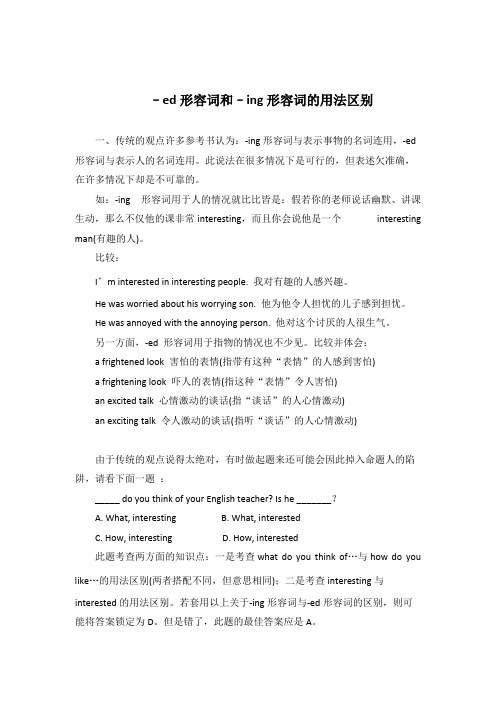
–ed形容词和–ing形容词的用法区别一、传统的观点许多参考书认为:-ing形容词与表示事物的名词连用,-ed 形容词与表示人的名词连用。
此说法在很多情况下是可行的,但表述欠准确,在许多情况下却是不可靠的。
如:-ing 形容词用于人的情况就比比皆是:假若你的老师说话幽默、讲课生动,那么不仅他的课非常interesting,而且你会说他是一个interesting man(有趣的人)。
比较:I’m interested in interesting people. 我对有趣的人感兴趣。
He was worried about his worrying son. 他为他令人担忧的儿子感到担忧。
He was annoyed with the annoying person. 他对这个讨厌的人很生气。
另一方面,-ed 形容词用于指物的情况也不少见。
比较并体会:a frightened look 害怕的表情(指带有这种“表情”的人感到害怕)a frightening look 吓人的表情(指这种“表情”令人害怕)an excited talk 心情激动的谈话(指“谈话”的人心情激动)an exciting talk 令人激动的谈话(指听“谈话”的人心情激动)由于传统的观点说得太绝对,有时做起题来还可能会因此掉入命题人的陷阱,请看下面一题:_____ do you think of your English teacher? Is he _______?A. What, interestingB. What, interestedC. How, interestingD. How, interested此题考查两方面的知识点:一是考查what do you think of…与how do you like…的用法区别(两者搭配不同,但意思相同);二是考查interesting与interested的用法区别。
形容词加动词ed的复合形容词
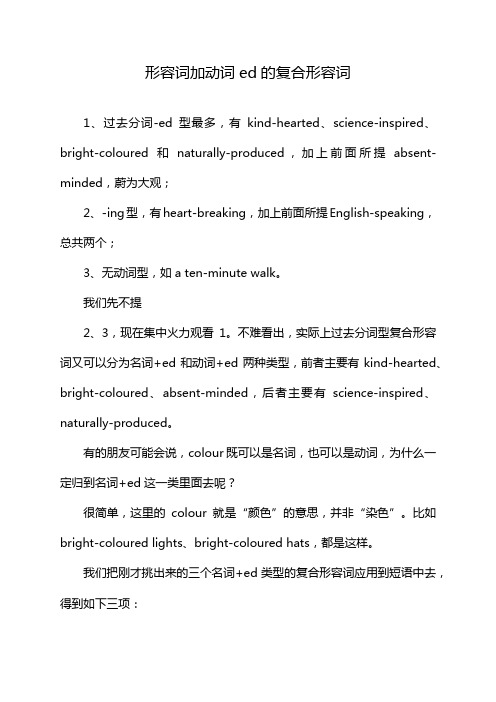
形容词加动词ed的复合形容词1、过去分词-ed型最多,有kind-hearted、science-inspired、bright-coloured和naturally-produced,加上前面所提absent-minded,蔚为大观;2、-ing型,有heart-breaking,加上前面所提English-speaking,总共两个;3、无动词型,如a ten-minute walk。
我们先不提2、3,现在集中火力观看1。
不难看出,实际上过去分词型复合形容词又可以分为名词+ed和动词+ed两种类型,前者主要有kind-hearted、bright-coloured、absent-minded,后者主要有science-inspired、naturally-produced。
有的朋友可能会说,colour既可以是名词,也可以是动词,为什么一定归到名词+ed这一类里面去呢?很简单,这里的colour就是“颜色”的意思,并非“染色”。
比如bright-coloured lights、bright-coloured hats,都是这样。
我们把刚才挑出来的三个名词+ed类型的复合形容词应用到短语中去,得到如下三项:kind-hearted people 好心人bright-coloured lights 颜色鲜艳的灯an absent-minded student 一名心不在焉的学生我把上面三个短语中的中心名词都用黑体表示了。
显然,加了-ed词尾的heart、colour和mind,分别是people、lights和student的一个组成部分,一个部件。
上述三个短语可以分别解释为:people who have kind heartslights which have bright coloursa student who has an absent mind由此,我们可以得出一个结论:“形容词+名词-ed”形式的复合形容词,一般是表示人或物的某组成部分(部件)所具备的品质。
–ed形容词和–ing形容词的用法区别
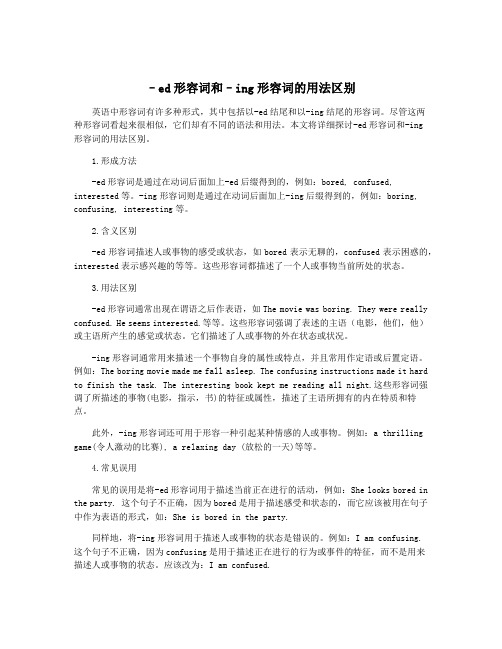
–ed形容词和–ing形容词的用法区别英语中形容词有许多种形式,其中包括以-ed结尾和以-ing结尾的形容词。
尽管这两种形容词看起来很相似,它们却有不同的语法和用法。
本文将详细探讨-ed形容词和-ing形容词的用法区别。
1.形成方法-ed形容词是通过在动词后面加上-ed后缀得到的,例如:bored, confused, interested等。
-ing形容词则是通过在动词后面加上-ing后缀得到的,例如:boring, confusing, interesting等。
2.含义区别-ed形容词描述人或事物的感受或状态,如bored表示无聊的,confused表示困惑的,interested表示感兴趣的等等。
这些形容词都描述了一个人或事物当前所处的状态。
3.用法区别-ed形容词通常出现在谓语之后作表语,如The movie was boring. They were really confused. He seems interested.等等。
这些形容词强调了表述的主语(电影,他们,他)或主语所产生的感觉或状态。
它们描述了人或事物的外在状态或状况。
-ing形容词通常用来描述一个事物自身的属性或特点,并且常用作定语或后置定语。
例如:The boring movie made me fall asleep. The confusing instructions made it hard to finish the task. The interesting book kept me reading all night.这些形容词强调了所描述的事物(电影,指示,书)的特征或属性,描述了主语所拥有的内在特质和特点。
此外,-ing形容词还可用于形容一种引起某种情感的人或事物。
例如:a thrilling game(令人激动的比赛), a relaxing day (放松的一天)等等。
4.常见误用常见的误用是将-ed形容词用于描述当前正在进行的活动,例如:She looks bored in the party. 这个句子不正确,因为bored是用于描述感受和状态的,而它应该被用在句子中作为表语的形式,如:She is bored in the party.同样地,将-ing形容词用于描述人或事物的状态是错误的。
ed形容词和-ing 形容词
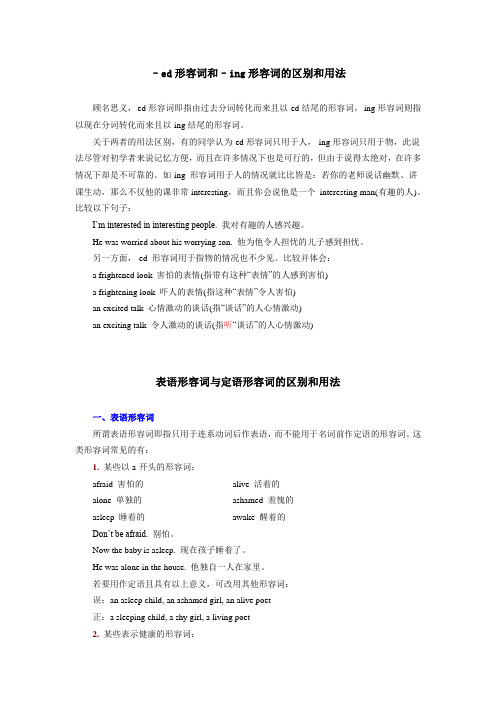
–ed形容词和–ing形容词的区别和用法顾名思义,-ed形容词即指由过去分词转化而来且以-ed结尾的形容词,-ing形容词则指以现在分词转化而来且以-ing结尾的形容词。
关于两者的用法区别,有的同学认为-ed形容词只用于人,-ing形容词只用于物,此说法尽管对初学者来说记忆方便,而且在许多情况下也是可行的,但由于说得太绝对,在许多情况下却是不可靠的。
如-ing 形容词用于人的情况就比比皆是:若你的老师说话幽默、讲课生动,那么不仅他的课非常interesting,而且你会说他是一个interesting man(有趣的人)。
比较以下句子:I’m interested in interesting people. 我对有趣的人感兴趣。
He was worried about his worrying son. 他为他令人担忧的儿子感到担忧。
另一方面,-ed 形容词用于指物的情况也不少见。
比较并体会:a frightened look 害怕的表情(指带有这种“表情”的人感到害怕)a frightening look 吓人的表情(指这种“表情”令人害怕)an excited talk 心情激动的谈话(指“谈话”的人心情激动)an exciting talk 令人激动的谈话(指听“谈话”的人心情激动)表语形容词与定语形容词的区别和用法一、表语形容词所谓表语形容词即指只用于连系动词后作表语,而不能用于名词前作定语的形容词。
这类形容词常见的有:1.某些以a-开头的形容词:afraid 害怕的alive 活着的alone 单独的ashamed 羞愧的asleep 睡着的awake 醒着的Don’t be afraid. 别怕。
Now the baby is asleep. 现在孩子睡着了。
He was alone in the house. 他独自一人在家里。
若要用作定语且具有以上意义,可改用其他形容词:误:an asleep child, an ashamed girl, an alive poet正:a sleeping child, a shy girl, a living poet2.某些表示健康的形容词:fine 健康的ill有病的well身体健康的“How’s your wife?” “She’s fine, thank you.” “你妻子好吗?”“她很好,谢谢。
ing ed 形容词的区别
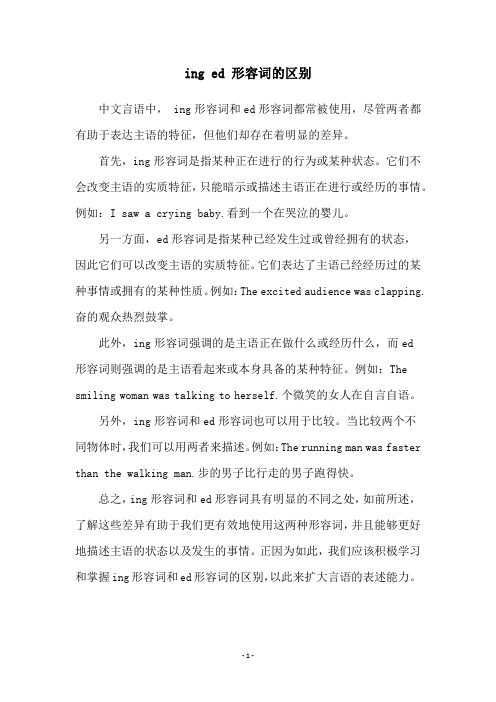
ing ed 形容词的区别
中文言语中, ing形容词和ed形容词都常被使用,尽管两者都有助于表达主语的特征,但他们却存在着明显的差异。
首先,ing形容词是指某种正在进行的行为或某种状态。
它们不会改变主语的实质特征,只能暗示或描述主语正在进行或经历的事情。
例如:I saw a crying baby.看到一个在哭泣的婴儿。
另一方面,ed形容词是指某种已经发生过或曾经拥有的状态,
因此它们可以改变主语的实质特征。
它们表达了主语已经经历过的某种事情或拥有的某种性质。
例如:The excited audience was clapping.奋的观众热烈鼓掌。
此外,ing形容词强调的是主语正在做什么或经历什么,而ed
形容词则强调的是主语看起来或本身具备的某种特征。
例如:The smiling woman was talking to herself.个微笑的女人在自言自语。
另外,ing形容词和ed形容词也可以用于比较。
当比较两个不
同物体时,我们可以用两者来描述。
例如:The running man was faster than the walking man.步的男子比行走的男子跑得快。
总之,ing形容词和ed形容词具有明显的不同之处,如前所述,了解这些差异有助于我们更有效地使用这两种形容词,并且能够更好地描述主语的状态以及发生的事情。
正因为如此,我们应该积极学习和掌握ing形容词和ed形容词的区别,以此来扩大言语的表述能力。
- 1 -。
带ed形容词
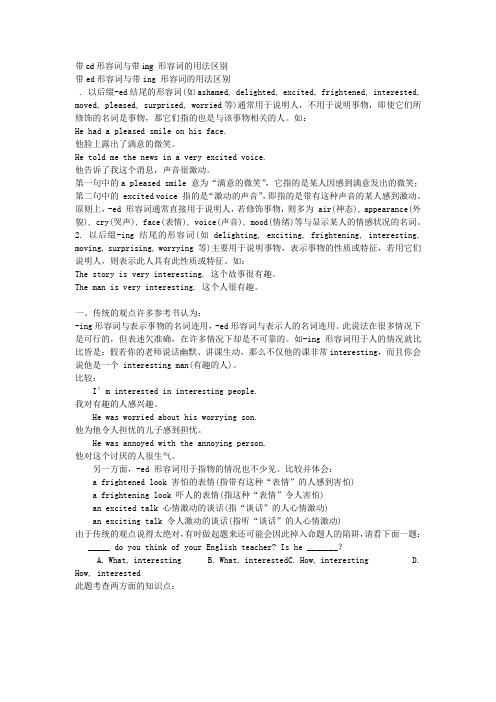
带ed形容词与带ing 形容词的用法区别带ed形容词与带ing 形容词的用法区别. 以后缀-ed结尾的形容词(如ashamed, delighted, excited, frightened, interested, moved, pleased, surprised, worried等)通常用于说明人,不用于说明事物,即使它们所修饰的名词是事物,那它们指的也是与该事物相关的人。
如:He had a pleased smile on his face.他脸上露出了满意的微笑。
He told me the news in a very excited voice.他告诉了我这个消息,声音很激动。
第一句中的a pleased smile 意为“满意的微笑”,它指的是某人因感到满意发出的微笑;第二句中的 excited voice 指的是“激动的声音”,即指的是带有这种声音的某人感到激动。
原则上,-ed 形容词通常直接用于说明人,若修饰事物,则多为 air(神态), appearance(外貌), cry(哭声), face(表情), voice(声音), mood(情绪)等与显示某人的情感状况的名词。
2. 以后缀-ing结尾的形容词(如delighting, exciting, frightening, interesting, moving, surprising, worrying 等)主要用于说明事物,表示事物的性质或特征,若用它们说明人,则表示此人具有此性质或特征。
如:The story is very interesting. 这个故事很有趣。
The man is very interesting. 这个人很有趣。
一、传统的观点许多参考书认为:-ing形容词与表示事物的名词连用,-ed形容词与表示人的名词连用。
此说法在很多情况下是可行的,但表述欠准确,在许多情况下却是不可靠的。
如-ing 形容词用于人的情况就比比皆是:假若你的老师说话幽默、讲课生动,那么不仅他的课非常interesting,而且你会说他是一个 interesting man(有趣的人)。
根据ing形容词和ed形容词经典练习
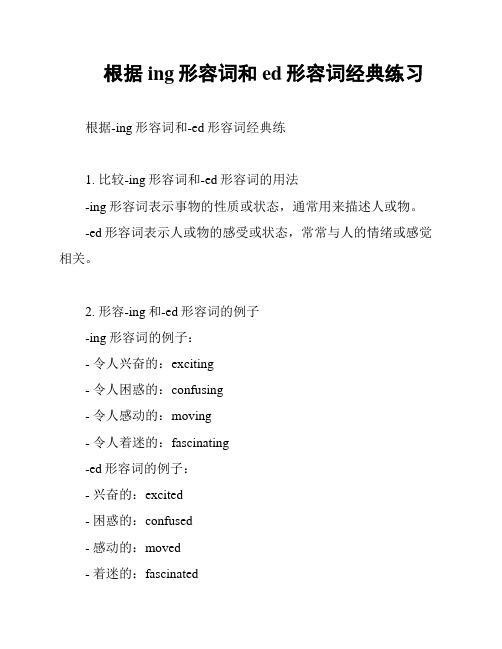
根据ing形容词和ed形容词经典练习根据-ing形容词和-ed形容词经典练1. 比较-ing形容词和-ed形容词的用法-ing形容词表示事物的性质或状态,通常用来描述人或物。
-ed形容词表示人或物的感受或状态,常常与人的情绪或感觉相关。
2. 形容-ing和-ed形容词的例子-ing形容词的例子:- 令人兴奋的:exciting- 令人困惑的:confusing- 令人感动的:moving- 令人着迷的:fascinating-ed形容词的例子:- 兴奋的:excited- 困惑的:confused- 感动的:moved- 着迷的:fascinated3. 区分-ing和-ed形容词的用法-ing形容词描述事物的性质或状态,而不是人或物的感受。
例如,“The movie was exciting.”(电影很刺激。
)表示电影本身很刺激,而不是人的感受。
-ed形容词描述人或物的感受或状态。
例如,“I was excited when I watched the movie.”(我看电影时感到兴奋。
)表示人对电影感到兴奋。
4. 练题请根据句子的语境选择合适的形容词,填入横线上:1. The book was __________.(interest/interested)2. I was __________ by the live concert.(amaze/amazed)3. The task seemed __________ at first.(confuse/confused)4. The movie was __________ and left me in tears.(move/moved)答案:1. interested2. amazed3. confusing4. moving总结:通过-ing形容词和-ed形容词的练习,我们可以更好地理解它们之间的区别和用法。
使用正确的形容词来描绘事物的性质和人的感受,能够让我们的语言更加准确生动。
ed转换来的表状态的形容词
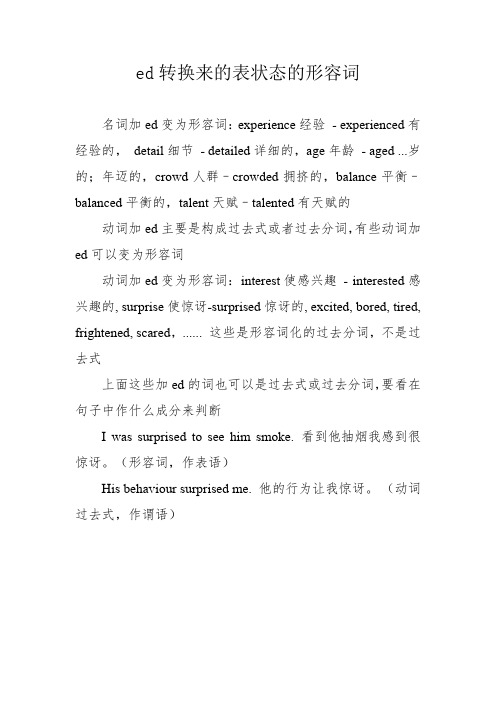
ed转换来的表状态的形容词
名词加ed变为形容词:experience经验- experienced有经验的,detail细节- detailed详细的,age年龄- aged ...岁的;年迈的,crowd人群–crowded拥挤的,balance平衡–balanced平衡的,talent天赋–talented有天赋的
动词加ed主要是构成过去式或者过去分词,有些动词加ed可以变为形容词
动词加ed变为形容词:interest使感兴趣- interested感兴趣的, surprise使惊讶-surprised惊讶的, excited, bored, tired, frightened, scared,...... 这些是形容词化的过去分词,不是过去式
上面这些加ed的词也可以是过去式或过去分词,要看在句子中作什么成分来判断
I was surprised to see him smoke. 看到他抽烟我感到很惊讶。
(形容词,作表语)
His behaviour surprised me. 他的行为让我惊讶。
(动词过去式,作谓语)。
ed修饰人还是物
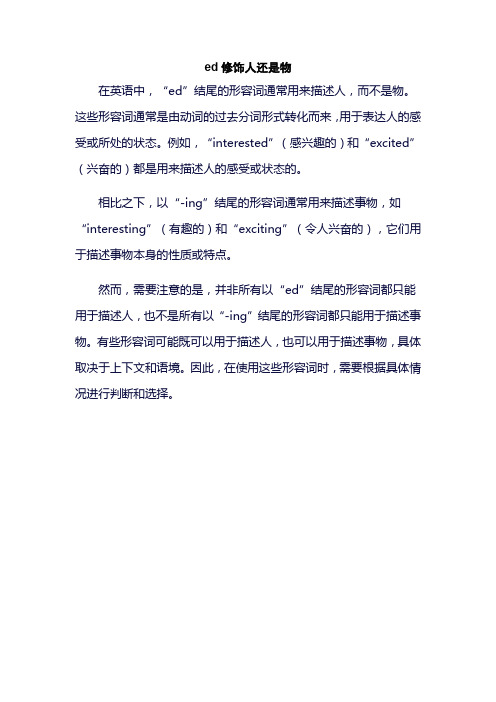
ed修饰人还是物
在英语中,“ed”结尾的形容词通常用来描述人,而不是物。
这些形容词通常是由动词的过去分词形式转化而来,用于表达人的感受或所处的状态。
例如,“interested”(感兴趣的)和“excited”(兴奋的)都是用来描述人的感受或状态的。
相比之下,以“-ing”结尾的形容词通常用来描述事物,如“interesting”(有趣的)和“exciting”(令人兴奋的),它们用于描述事物本身的性质或特点。
然而,需要注意的是,并非所有以“ed”结尾的形容词都只能用于描述人,也不是所有以“-ing”结尾的形容词都只能用于描述事物。
有些形容词可能既可以用于描述人,也可以用于描述事物,具体取决于上下文和语境。
因此,在使用这些形容词时,需要根据具体情况进行判断和选择。
- 1、下载文档前请自行甄别文档内容的完整性,平台不提供额外的编辑、内容补充、找答案等附加服务。
- 2、"仅部分预览"的文档,不可在线预览部分如存在完整性等问题,可反馈申请退款(可完整预览的文档不适用该条件!)。
- 3、如文档侵犯您的权益,请联系客服反馈,我们会尽快为您处理(人工客服工作时间:9:00-18:30)。
-ed形容词和-ing形容词
传统的观点认为:-ing形容词与表示事物的名词连用,-ed形容词与表示人的名词连用。
此说法在很多情况下是可行的,但表述欠准确,在许多情况下却是不可靠的。
如-ing 形容词用于人的情况就比比皆是:假若你的老师说话幽默、讲课生动,那么不仅他的课非常interesting,而且你会说他是一个interesting man(有趣的人)。
比较:
I’m interested in interesting people. 我对有趣的人感兴趣。
He was worried about his worrying son. 他为他令人担忧的儿子感到担忧。
He was annoyed with the annoying person. 他对这个讨厌的人很生气。
另一方面,-ed 形容词用于指物的情况也不少见。
比较并体会:
a frightened look 害怕的表情(指带有这种“表情”的人感到害怕)
a frightening look 吓人的表情(指这种“表情”令人害怕)
an excited talk 心情激动的谈话(指“谈话”的人心情激动)
an exciting talk 令人激动的谈话(指听“谈话”的人心情激动)
由于传统的观点说得太绝对,有时做起题来还可能会因此掉入命题人的陷阱,如:_____ do you think of your English teacher? Is he _______?
A. What, interesting
B. What, interested
C. How, interesting
D. How, interested 此题考查两方面的知识点:一是考查what do you think of…与how do y ou like…的用法区别(两者搭配不同,但意思相同);二是考查interesting与interested的用法区别。
若套用以上关于-ing形容词与-ed形容词的区别,则可能将答案错定为D。
此题的正确答案应是A。
关于-ing形容词与-ed形容词的区别,准确的表述应该是:
1. 以后缀–ed结尾的形容词(如ashamed, delighted, excited, frightened, interested, moved, pleased, surprised, worried等)通常用于说明人,不用于说明事物,即使它们所修饰的名词是事物,那它们指的也是与该事物相关的人。
如:
He had a pleased smile on his face. 他脸上露出了满意的微笑。
He told me the news in a very excited voice. 他声音很激动地告诉了我这个消息。
第一句中的a pleased smile 意为“满意的微笑”,它指的是某人因感到满意发出的微笑;第二句中的 a very excited voice 指的是“很激动的声音”,即指的是某人因很激动而发生那样的声音。
原则上,-ed 形容词通常直接用于说明人,若修饰事物,则多为air(神态), appearance(外貌), cry(哭声), face(表情), voice(声音), mood(情绪)等显示某人的情感状况的名词。
2. 以后缀-ing 结尾的形容词(如delighting, exciting, frightening, interesting, moving, surprising, worrying 等)主要用于说明事物,表示事物的性质或特征,若用它们说明人,则表示此人具有此性质或特征。
如:
The story is very interesting. 这个故事很有趣。
The man is very interesting. 这个人很有趣。
请再比较并体会以下句子:
He is frightened. 他很害怕。
He is frightening. 他很吓人。
He has a frightened look on his face. 他脸上带有惊恐的神情。
He has a frightening look on his face. 他脸上带有吓人的神情。
I read an interested expression on his face. 我看到他脸上露出一种感兴趣的表情。
I read an interesting expression on his face. 我看到他脸上露出一种有趣的表情。
ed形式及常见短语与ing形式形容词归纳
excited (be ~d about) / exciting
surprised (be ~d at) //surprising
amazed吃惊的(be ~d at) //amazing
frustrated挫败的,失意的,泄气的;(be ~d of) / frustrating
interested (be ~ed in) / interesting
thrilled非常兴奋的;极为激动的;(be ~ed at) / thrilling
pleased (be ~d with) / pleasing, = pleasant
satisfied(be satisfied with) / satisfying
frightened (be ~ed at / of ) / frightening
tired (be ~d of) / tiring
bored (be ~d with) / boring
relaxed (无固定搭配) / relaxing
annoyed恼怒的(be ~ed with) / annoying
moved (be ~d by) / moving
worried (be worried about) / worrying
confused糊涂的(be confused about) / confusing
练习:
一用括号内所给动词的-ed形式或-ing形式填空
1. The children were ____after the trip. (tire)
2. The trip was____. (tire)
3. The ____children went to bed early after the trip. (tire)
4. The ____trip lasted a whole day. (tire)
5. The trip made the children____. (tire)
6. The bad weather made the trip____. (tire)
7. Tom’s parents are ________ at his ____________ results of the exams.(disappoint)
8. ____and angry, he left the meeting-room. (disappoint)
9. It is ____that he didn’t pass the examination.(disappoint)
10. When hearing the____ news that Michael Jackson passed away, they were______ to look at each other. (surprise)
11. He was ____ about his ____ son. (worry)
12. I'm not ____with his answer to this question (satisfy)
13. He was ____with the ____person. (annoy)
14. A police car appeared on the road, the thief had a____ look on his face. (frighten)
15. The situation here is ____and we are____. (encourage)
答案:
1. tired
2. tiring
3. tired
4. tiring
5. tired
6. tiring
7. disappointed, disappointing
8. Disappointed
9. disappointing
10. surprising; surprised 11. worried; worrying 12. satisfied 13. annoyed; annoying 14. frightened。
